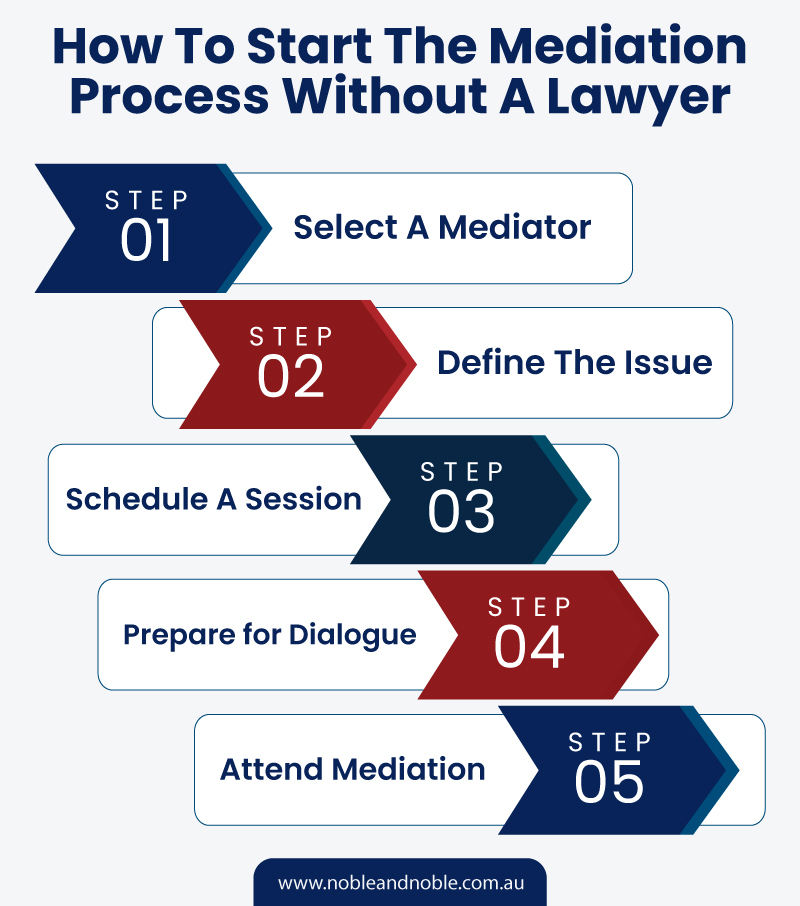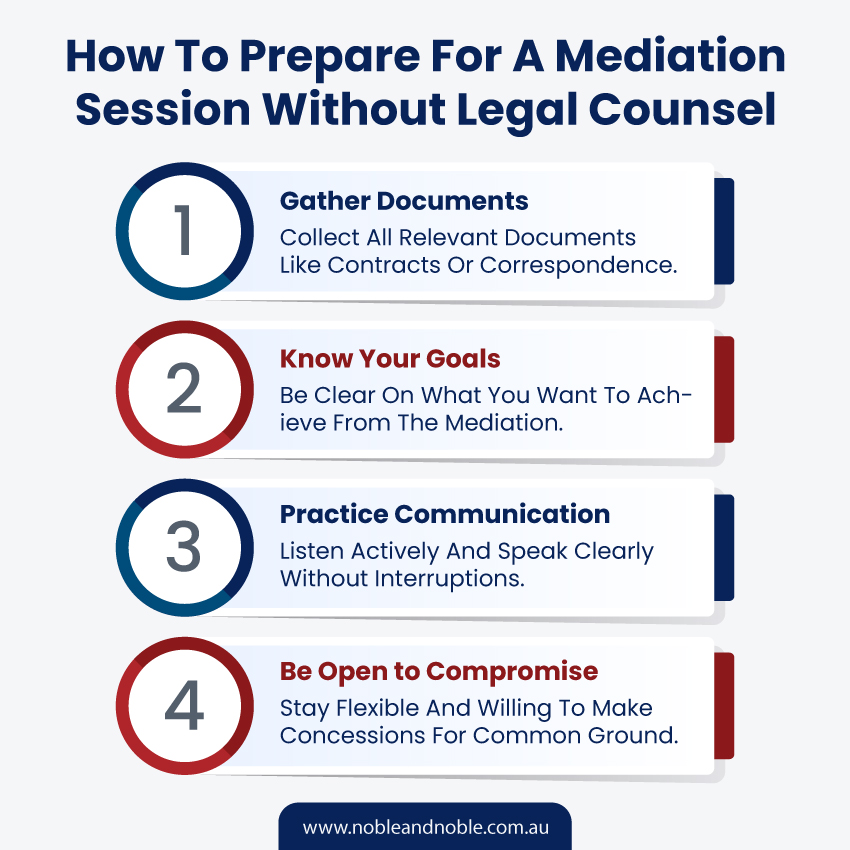
Mediation Without Lawyers: Affordable and Efficient Dispute Resolution
In today’s fast-paced world, finding effective solutions to legal disputes without the need for formal court proceedings is increasingly popular. Mediation without lawyers is quickly becoming a go-to option for people looking to save time, reduce costs, and resolve their conflicts amicably. The approach bypasses much of the complexity of traditional litigation and offers parties a more collaborative path toward finding mutually agreeable solutions.
Mediation without legal representation doesn’t mean that disputes become harder to resolve. Quite the opposite, actually. With the help of an experienced mediator, individuals can effectively settle disagreements, from family issues to business conflicts, without ever needing to hire a lawyer. But how exactly does this process work, and why are so many people opting for lawyer-free mediation? Let’s dive deeper.
Table of Contents
What is Mediation Without Lawyers?
At its core, mediation without lawyers is a process where disputing parties work with a neutral third-party mediator to reach a voluntary settlement. Unlike court cases, where a judge imposes a decision, mediation encourages dialogue and cooperation. The mediator doesn’t act as a judge or arbitrator but instead helps both sides communicate, ensuring the conversation remains respectful and productive.
One key difference here is that neither party has a lawyer representing them during the mediation process. This makes the process more affordable and less formal, as it removes the need for complex legal strategies and costly legal fees. Without the adversarial nature that lawyers often bring to the table, parties often feel more in control of their outcomes.
Why More People Are Choosing Mediation Without Legal Representation?
Many individuals are turning to mediation as an alternative to costly legal battles, and for good reason. Mediation without lawyers comes with a host of benefits:
- Cost Savings: One of the most obvious reasons for choosing mediation without lawyers is the substantial financial savings. Traditional legal disputes can quickly rack up thousands of dollars in legal fees. In contrast, mediating a conflict without attorneys means paying only for the mediator’s services, which tend to be much less expensive.
- Faster Resolutions: Litigation can drag on for months or even years. By contrast, mediation often leads to quicker resolutions. Without the bureaucratic delays of the court system or the back-and-forth negotiations typical between lawyers, mediation sessions can resolve disputes in a fraction of the time.
- Flexibility and Control: In court, the final decision is in the hands of a judge, which can sometimes feel unfair or out of one’s control. Mediation without lawyers empowers the individuals involved to have a say in the outcome, allowing them to shape their own agreement based on their needs.
- Reduced Stress: The legal system is notorious for its complexity and stress. Mediation without legal representation simplifies the process, fostering an environment where both parties can engage in open dialogue and work toward an amicable solution. By sidestepping lengthy courtroom battles, the emotional toll of the dispute is significantly reduced.
- Preserved Relationships: Since mediation is a more collaborative and less adversarial process, it can be especially beneficial in situations where maintaining a relationship is important. Family mediation, in particular, can help preserve healthy communication between parties, which is vital when children are involved.
How to Start the Mediation Process Without a Lawyer?

Starting the mediation process without legal representation might seem daunting at first, but it’s relatively straightforward. The first step is selecting an experienced mediator who is skilled in the area of your dispute. For example, if the issue is related to family law (such as a divorce or child custody), a mediator with experience in this field will be a better fit.
Key Steps to Begin Mediation:
- Select a Mediator: Research qualified mediators in your area. Often, mediation centres or online directories can help connect you with an appropriate professional.
- Define the Issue: Both parties must have a clear understanding of the conflict and be willing to compromise. Going into mediation without a firm grasp of what you want to achieve can hinder progress.
- Schedule a Session: Once a mediator is chosen, schedule a meeting. Mediation sessions can take place in-person or remotely, offering flexibility for both parties.
- Prepare for Dialogue: Before the session, it’s essential to organise your thoughts and identify your goals. You should also gather any relevant documents or evidence that might support your position.
- Attend Mediation: During the session, the mediator will facilitate a conversation between both parties. The goal is to identify points of agreement and help resolve areas of conflict.
Throughout this process, the mediator remains a neutral party, guiding discussions but never imposing solutions. The focus is always on cooperation and finding common ground.
The Role of Mediators in Lawyer-Free Disputes
Mediators play a crucial role in mediation without lawyers. Their expertise lies not in the law but in conflict resolution, communication, and negotiation techniques. They are specially trained to remain neutral, ensuring that each party has a voice and that the process remains fair.
The mediator’s main responsibilities include:
- Facilitating Discussions: Helping both parties articulate their concerns without escalating tensions.
- Clarifying Issues: Ensuring that both sides fully understand the points of dispute and are clear about each other’s positions.
- Encouraging Compromise: Finding areas where both parties are willing to make concessions, creating a foundation for agreement.
- Ensuring Fairness: While mediators do not make decisions, they ensure that the mediation is balanced and that neither party dominates the conversation.
By acting as a facilitator rather than an enforcer, the mediator empowers both parties to work collaboratively toward a solution.
How to Prepare for a Mediation Session Without Legal Counsel?

Preparing for mediation without legal counsel requires careful planning. Since there won’t be a lawyer present to advocate on your behalf, it’s important to be fully prepared. Here’s how you can ensure you’re ready for your mediation session:
- Gather Information: Collect all relevant documents related to your dispute, such as contracts, financial statements, or correspondence.
- Know Your Goals: Understand what you hope to achieve from mediation. Being clear about your desired outcomes helps keep the conversation focused and productive.
- Practise Effective Communication: Active listening and clear communication are essential during mediation. Be ready to listen to the other party’s concerns without interrupting, and articulate your points calmly and clearly.
- Be Open to Compromise: Mediation is about finding common ground. Be prepared to make concessions and remain flexible during the discussions.
By entering mediation well-prepared, you significantly increase your chances of reaching a satisfactory agreement.
Success Stories: Real-Life Examples of Mediation Without Lawyers
Many individuals have successfully navigated mediation without legal representation, achieving positive outcomes while saving both time and money. Here are a few success stories:
- Sarah and John, a divorcing couple, chose mediation instead of hiring lawyers. By working directly with a family mediator, they were able to agree on child custody arrangements and the division of their assets in just two sessions, saving thousands in legal fees.
- In a business dispute, two small business owners reached an agreement over a contract issue through mediation. Without involving lawyers, they resolved their conflict within a week and resumed their professional relationship.
These stories highlight how mediation without lawyers can lead to fast, fair, and affordable resolutions.
Final Thoughts: Mediation as a Modern Alternative to Litigation
As the legal landscape continues to evolve, mediation without lawyers is emerging as an effective, efficient, and cost-saving alternative to traditional litigation. By providing individuals with more control over their disputes and encouraging cooperation over conflict, mediation offers a forward-thinking approach to resolving issues.
Whether you’re facing a family dispute, a business conflict, or any other kind of disagreement, consider mediation without lawyers as a viable path to resolution. The process not only saves time and money but often preserves relationships and promotes healthier, long-term outcomes.
FAQs
What is mediation without lawyers?
Mediation without lawyers is a conflict resolution process where parties work with a neutral mediator to reach an agreement without legal representation.
Why is mediation without lawyers cheaper?
Without the need for expensive legal fees, individuals only pay for the mediator’s services, which are generally much more affordable.
Can mediation work for complex disputes?
Yes, even complex disputes can benefit from mediation, as the process encourages collaboration and compromise, often leading to more creative solutions.
How long does mediation without lawyers typically take?
Mediation is typically much faster than litigation, often resolving in a few sessions, depending on the complexity of the dispute.
Do I need to prepare differently for mediation without a lawyer?
Yes, you need to be more self-reliant, gather all relevant documents, know your goals, and be prepared to communicate effectively during the sessions.
What kind of disputes can be resolved through mediation?
Mediation is suitable for a wide range of disputes, including family matters, business disagreements, workplace conflicts, and more.




